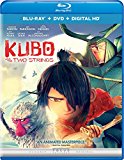| Reviews & Columns |
|
Reviews DVD TV on DVD Blu-ray 4K UHD International DVDs In Theaters Reviews by Studio Video Games Features Collector Series DVDs Easter Egg Database Interviews DVD Talk Radio Feature Articles Columns Anime Talk DVD Savant Horror DVDs The M.O.D. Squad Art House HD Talk Silent DVD
|
DVD Talk Forum |
|
|
| Resources |
|
DVD Price Search Customer Service #'s RCE Info Links |
|
Columns
|
|
|
Kubo and the Two Strings
Universal // PG // November 22, 2016
List Price: $34.98 [Buy now and save at Amazon]
The Film:
Several years ago, the Portland-based animation company Laika Entertainment emerged on the scene with the dazzling Coraline, a stop-motion journey into a mythical world adapted from the works of Neil Gaiman. Filled with dark whimsy and meaningful allegory, the Henry Selick-directed story put the animation studio on the map with its hypnotic, outlandish fusion of reality and nightmarish fantasy. Since then, the studio has been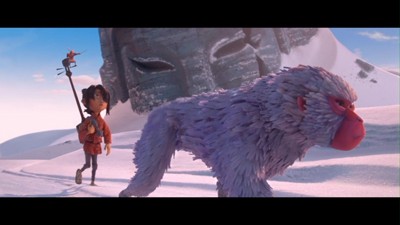 chasing after that same kind of artistic success, yet their following works -- ParaNorman and The Boxtrolls -- have been jaw-dropping works of visual creativity that lack the kind of substance that made their introductory work such a memorable experience. When Kubo and the Two Strings came crashing onto the scene with its Japanese-inspired setting, fairytale trappings, and symbolic storytelling centered on a child's voyage amid hardship, it appeared as if Laika might've rediscovered the same type of haunting magic that filled their first feature, and that turned out to be right. This is a stunning, quite memorable piece of artistry.
chasing after that same kind of artistic success, yet their following works -- ParaNorman and The Boxtrolls -- have been jaw-dropping works of visual creativity that lack the kind of substance that made their introductory work such a memorable experience. When Kubo and the Two Strings came crashing onto the scene with its Japanese-inspired setting, fairytale trappings, and symbolic storytelling centered on a child's voyage amid hardship, it appeared as if Laika might've rediscovered the same type of haunting magic that filled their first feature, and that turned out to be right. This is a stunning, quite memorable piece of artistry.
Positioned on the very edge of a seaside village in the midst of its rocky terrain, a young, half-blind boy named Kubo ekes out a meager existence with his ill mother, exposed to little of his enigmatic past. To make money, Kubo -- earnestly voiced by Game of Thrones' Art Parkinson -- tells stories, plucking the strings of his guitar while his secret magical abilities give shape to slips of paper, creating origami displays that lend visuals to his thrilling adventures. In the rare moments his mother comes out of her despondent stupor, she warns him of the nighttime: the threat that might come and whisk him away to see his evil grandfather, if he's not careful. Circumstances force Kubo to face the reality of this threat, sending him on a far-away search to locate the magical pieces of armor worn by his father, the great samurai who died trying to save his child's other eye. With the help of a talking monkey (Charlize Theron) and a beetle-like warrior (Matthew McConaughey), Kubo travels far and wide across all sorts of terrains, while discovering the extent of his magical ability in the process.
A breathtaking, unmistakably Eastern-oriented setting surrounds Kubo and the Two Strings, with waves that violently crash upon rocks protruding from the water, somber rice dinners over candlelight, and delicately sun-covered scenes of a young boy entertaining a crowd of villagers with his stories. Before Laika enters the comfort zone of their fantasy realms, they build up a splendidly detailed and involving reality out of Kubo's quaint residence, steeped in cultural legends and reflective on loved ones who've passed on. Flickers of magical elements can be found early in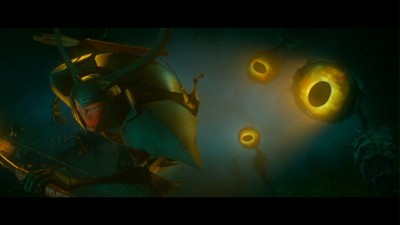 Kubo's story, notably around his ability to manipulate paper with his gifted guitar-plucking, and it's easy to get caught up in even those minor doses of wizardry concocted by the stop-motion animation. This is secondary to the dramatic essence created through Kubo's saddening-yet-hopeful interactions with his mother and the work he puts into feeding the pair of them, which taps into an honest and solemn depiction of coping with dementia and illness, strengthening the young boy's character in the process.
Kubo's story, notably around his ability to manipulate paper with his gifted guitar-plucking, and it's easy to get caught up in even those minor doses of wizardry concocted by the stop-motion animation. This is secondary to the dramatic essence created through Kubo's saddening-yet-hopeful interactions with his mother and the work he puts into feeding the pair of them, which taps into an honest and solemn depiction of coping with dementia and illness, strengthening the young boy's character in the process.
By lingering on this dramatic intimacy at the beginning, Kubo and the Two Strings builds a rock-solid foundation for the outlandish adventure that's to come for the young boy ... and what an adventure it becomes. From frigid, snowy expanses and subterranean caverns to the volatile peaks and depths of the ocean, the search for his family's armor leads Kubo and his companions -- guardians, more like -- far and wide across this mythical realm. Along the way, Kubo discovers more about the magical abilities that he's inherited and how it can be used against the obstacles thrown at him, brought to life through Laika's endlessly creative and mesmerizingly detailed craftsmanship. The life they conjure within Kubo's surroundings is staggering, with environments full of expansive scope and harrowing intensity, bequeathing the journey with deep-rooted, textured authenticity that never leaves one without something to marvel at. These things build toward thrilling action sequences, whose vigor rivals that of most of the summer's blockbusters, never shying away from the scale of colossal beasts, nimble villains, and grandiose enchantments.
The true power of Kubo and the Two Strings lies in the characters, though, both the personalities themselves and the ways in which they interweave with the film's meaningful intentions. They work so well because of the synergy Laika generates between the phenomenal voice cast and the incredible expressiveness of the stop-motion animation's faces, whether we're talking about how Charlize Theron's voice disappears in the protective, hesitantly quirky responses of Monkey or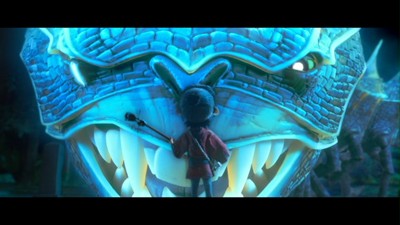 Matthew McConaughey's recognizable but entirely charming presence as the affable Beetle. During the safe stretches of their journey, the warmth of their emotions radiates alongside the script's poignant desires. Amidst the dangers of battle against their foes -- notably the pitch-perfect shrill vocals from Rooney Mara as Kubo's spectral Aunts, manifesting into one of the year's best villains -- the evolving, fraught looks on their faces draw one deeper and deeper into the profoundness of Kubo's trials.
Matthew McConaughey's recognizable but entirely charming presence as the affable Beetle. During the safe stretches of their journey, the warmth of their emotions radiates alongside the script's poignant desires. Amidst the dangers of battle against their foes -- notably the pitch-perfect shrill vocals from Rooney Mara as Kubo's spectral Aunts, manifesting into one of the year's best villains -- the evolving, fraught looks on their faces draw one deeper and deeper into the profoundness of Kubo's trials.
Just on the surface, Kubo and the Two Strings ties together the enduring bonds between family, the discovery of one's deeper gifts, and the enormity of loss into this brisk, emotive fantasy that wastes very little precious time in its 100-minute span. Dazzling martial-arts battles mix together with methodical, yet brisk pacing and Laika's bravely bittersweet inclinations to take their stories into melancholy territory, ever driven by the striking sounds of Kubo's guitar ringing in the air. All this mounts into a rewarding quest for the young boy that distills folklore and allegory into a powerful tale, one that continues to peel away layers throughout involving the significance of memory and moving forward no matter what. Kubo urges the audience not to blink while observing this story, and the way Laika's built this beautiful masterwork leaves absolutely no reason to do so, all the way until the film's heart-rending reveal of the significance of those two strings.
Note: Film Review From Theatrical Coverage: Here
The Blu-ray:
Kubo and the Two Strings crashes onto Blu-ray in a fairly standard package from Universal Home Entertainment, a two-disc set containing the Blu-ray and DVD, each of which feature bland, silver-topped artwork as has become customary of the label. An embossed slipcover spices up the package, though, with raised lettering and character designs alongside the quasi-woodblock design on the front. A Digital Copy Slip has also been tucked inside.
Video and Audio:
Kubo and the Two Strings really strikes a chord on Blu-ray, but that's unsurprising considering the beauty of the stop-motion animation and Universal's track record with their previous releases of Laika's films. The fantastical journey was breathtaking in theaters, and it's just as breathtaking at home: this 2.35:1-framed, 1080p AVC transfer is packed to the brim with vivid shades of color and ornate textures in the character models and sets, ranging from Japanese-inspired villages to rain-covered shots of open seas, lush green journeys through forests, and bustling hikes across snow-covered landscapes. Laika's playfulness with the palette coaxes fresh, inviting colors out of the high-definition treatment -- the pinkish hues around Monkey's eyes and mouth, dark greenish-yellow murkiness underwater, the almost-pastel shades of muted, glowing blues of specters -- which are immaculately saturated and kept under control alongside the faultless contrast levels. Fine details are everywhere, from strands of hair to weathered samurai armor and amber leaves, which are always sharp and retain the textile property of the stop-motion creations.
Considering those stop-motion roots, one might not be prepared for the sheer amount of genuine action that takes place in Kubo and the Two Strings, from aggressive martial-arts battles to encounters with a few different massive beasts. The DTS-HD Master Audio track is, thus, given a daunting quest to overcome with the clanking of blades, the thumping of bodies, and the pounding of waves, all of which sounds tremendous in high-definition. The bass channel tackles the aggressive elements like a champ, boasting deep, throaty impact without unnecessary or out-of-control rumble, creating a vigorous rush of activity that boasts as much -- if not more -- intensity as many of the tentpole blockbusters that came out this year. Delicate, nuanced effects are also in great supply here, from folding origami paper to a fish splashing in water and ceramic bowls lightly touching a hard surface, which remains exceedingly clear and convincing throughout. Dialogue holds onto the same property, balancing clarity with mid-range bass response, while the gorgeous strums of the guitar and the other musical elements are robust yet incredibly natural ... and everything ventures out to the surround channels with authenticity. Phenomenal audio treatment.
Special Features:
Commentary with Director Travis Knight:
Director Knight warns the audience that they should possibly lower their expectations toward his first commentary track for his first directorial effort, and it's a dose of mildly charming casualness that isn't exactly indicative of the track to come ... which, by the way, ends up being a great thing. He's clearly prepared for this discussion, and the fusion of scene-by-scene elaboration and tangential discussions about the complex artistry that goes into these productions proves to be a delightful experience, if a tad studious and rehearsed in tempo. Knight discusses the materials used to get the origami textures right and the geometry of sequences, pointing out which sequences involve touches of computer-generated effects and which ones require extra-arduous handmade effects (such as grooves in snow and the material that makes up Kubo's hair), name-drops of Star Trek and Star Wars for different reasons and references, and a wealth of thematic symbols and intentions. Knight has no problem pulling back the curtain on how it's all made, and it's a great track for it.
Kubo's Journey (28:34, 16x9 HD):
Similar to how Universal has handled previous home-video releases for Laika's films, they've included a connected collection of interviews and behind-the-scenes shots, elevating the standard press-kit snippets found in other home-video presentations. They delve into the cultural and historical inspirations in the film, navigating the complications of capturing extremely large puppets, rendering convincing elemental effects for water, and the work that went into capturing a specific mood for the film's music. The snippets are bookended by discussions by director Travis Knight, crafting a satisfying glimpse into some of the components that went into the creation of Kubo and the Two Strings.
Universal have also included a few other quick featurettes that retrace many of the same steps as the previous extras, only in more compact form. Corners of the Earth (3:12, 16x9 HD) takes a general and quick glimpse at the numerous environments captured in the film, featuring shots of the research and production elements that went into crafting their vision, while The Myth of Kubo (2:33, 16x9 HD) centers on general discussion about the film being "a stop-motion samurai film", and features a few tastes of interviews from the tentpole actors in the film. The DVD Copy of the film doesn't come loaded with all the special features listed above, missing all of Kubo's Journey except for the section focused on its Japanese inspiration, but it does include the commentary and about fifteen minutes or so of the extras.
Final Thoughts:
I left the theater thinking that Kubo and the Two Strings was a magical, sprawling, and thrilling animated experience with something profound and metaphorical at its core, and that sentiment has stuck around after a second viewing, elevated by further appreciation of the artistry that Laika poured into its conception. Kubo's journey takes him through the fantastical and the melancholy, culminating into a stunning stop-motion action film that's full of boundless beauty, splashes of affable humor, and a strong emotional current that elevates it to one of the year's best films, period. Universal's Blu-ray presents these things in the utmost audiovisual quality on Blu-ray, and comes with a insightful, scholarly commentary with director Travis Knight and satisfactory half-hour of featurettes. A few more extras (and a trailer) would've been nice, but the technical presentation of this wonderful film and the available features takes the quality up just high enough to earn DVDTalk's Collector Series stamp of approval.
Thomas Spurlin, Staff Reviewer -- DVDTalk Reviews | Personal Blog/Site
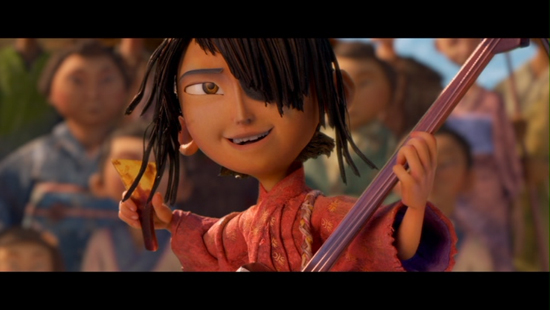 |
Several years ago, the Portland-based animation company Laika Entertainment emerged on the scene with the dazzling Coraline, a stop-motion journey into a mythical world adapted from the works of Neil Gaiman. Filled with dark whimsy and meaningful allegory, the Henry Selick-directed story put the animation studio on the map with its hypnotic, outlandish fusion of reality and nightmarish fantasy. Since then, the studio has been
 chasing after that same kind of artistic success, yet their following works -- ParaNorman and The Boxtrolls -- have been jaw-dropping works of visual creativity that lack the kind of substance that made their introductory work such a memorable experience. When Kubo and the Two Strings came crashing onto the scene with its Japanese-inspired setting, fairytale trappings, and symbolic storytelling centered on a child's voyage amid hardship, it appeared as if Laika might've rediscovered the same type of haunting magic that filled their first feature, and that turned out to be right. This is a stunning, quite memorable piece of artistry.
chasing after that same kind of artistic success, yet their following works -- ParaNorman and The Boxtrolls -- have been jaw-dropping works of visual creativity that lack the kind of substance that made their introductory work such a memorable experience. When Kubo and the Two Strings came crashing onto the scene with its Japanese-inspired setting, fairytale trappings, and symbolic storytelling centered on a child's voyage amid hardship, it appeared as if Laika might've rediscovered the same type of haunting magic that filled their first feature, and that turned out to be right. This is a stunning, quite memorable piece of artistry. Positioned on the very edge of a seaside village in the midst of its rocky terrain, a young, half-blind boy named Kubo ekes out a meager existence with his ill mother, exposed to little of his enigmatic past. To make money, Kubo -- earnestly voiced by Game of Thrones' Art Parkinson -- tells stories, plucking the strings of his guitar while his secret magical abilities give shape to slips of paper, creating origami displays that lend visuals to his thrilling adventures. In the rare moments his mother comes out of her despondent stupor, she warns him of the nighttime: the threat that might come and whisk him away to see his evil grandfather, if he's not careful. Circumstances force Kubo to face the reality of this threat, sending him on a far-away search to locate the magical pieces of armor worn by his father, the great samurai who died trying to save his child's other eye. With the help of a talking monkey (Charlize Theron) and a beetle-like warrior (Matthew McConaughey), Kubo travels far and wide across all sorts of terrains, while discovering the extent of his magical ability in the process.
A breathtaking, unmistakably Eastern-oriented setting surrounds Kubo and the Two Strings, with waves that violently crash upon rocks protruding from the water, somber rice dinners over candlelight, and delicately sun-covered scenes of a young boy entertaining a crowd of villagers with his stories. Before Laika enters the comfort zone of their fantasy realms, they build up a splendidly detailed and involving reality out of Kubo's quaint residence, steeped in cultural legends and reflective on loved ones who've passed on. Flickers of magical elements can be found early in
 Kubo's story, notably around his ability to manipulate paper with his gifted guitar-plucking, and it's easy to get caught up in even those minor doses of wizardry concocted by the stop-motion animation. This is secondary to the dramatic essence created through Kubo's saddening-yet-hopeful interactions with his mother and the work he puts into feeding the pair of them, which taps into an honest and solemn depiction of coping with dementia and illness, strengthening the young boy's character in the process.
Kubo's story, notably around his ability to manipulate paper with his gifted guitar-plucking, and it's easy to get caught up in even those minor doses of wizardry concocted by the stop-motion animation. This is secondary to the dramatic essence created through Kubo's saddening-yet-hopeful interactions with his mother and the work he puts into feeding the pair of them, which taps into an honest and solemn depiction of coping with dementia and illness, strengthening the young boy's character in the process. By lingering on this dramatic intimacy at the beginning, Kubo and the Two Strings builds a rock-solid foundation for the outlandish adventure that's to come for the young boy ... and what an adventure it becomes. From frigid, snowy expanses and subterranean caverns to the volatile peaks and depths of the ocean, the search for his family's armor leads Kubo and his companions -- guardians, more like -- far and wide across this mythical realm. Along the way, Kubo discovers more about the magical abilities that he's inherited and how it can be used against the obstacles thrown at him, brought to life through Laika's endlessly creative and mesmerizingly detailed craftsmanship. The life they conjure within Kubo's surroundings is staggering, with environments full of expansive scope and harrowing intensity, bequeathing the journey with deep-rooted, textured authenticity that never leaves one without something to marvel at. These things build toward thrilling action sequences, whose vigor rivals that of most of the summer's blockbusters, never shying away from the scale of colossal beasts, nimble villains, and grandiose enchantments.
The true power of Kubo and the Two Strings lies in the characters, though, both the personalities themselves and the ways in which they interweave with the film's meaningful intentions. They work so well because of the synergy Laika generates between the phenomenal voice cast and the incredible expressiveness of the stop-motion animation's faces, whether we're talking about how Charlize Theron's voice disappears in the protective, hesitantly quirky responses of Monkey or
 Matthew McConaughey's recognizable but entirely charming presence as the affable Beetle. During the safe stretches of their journey, the warmth of their emotions radiates alongside the script's poignant desires. Amidst the dangers of battle against their foes -- notably the pitch-perfect shrill vocals from Rooney Mara as Kubo's spectral Aunts, manifesting into one of the year's best villains -- the evolving, fraught looks on their faces draw one deeper and deeper into the profoundness of Kubo's trials.
Matthew McConaughey's recognizable but entirely charming presence as the affable Beetle. During the safe stretches of their journey, the warmth of their emotions radiates alongside the script's poignant desires. Amidst the dangers of battle against their foes -- notably the pitch-perfect shrill vocals from Rooney Mara as Kubo's spectral Aunts, manifesting into one of the year's best villains -- the evolving, fraught looks on their faces draw one deeper and deeper into the profoundness of Kubo's trials. Just on the surface, Kubo and the Two Strings ties together the enduring bonds between family, the discovery of one's deeper gifts, and the enormity of loss into this brisk, emotive fantasy that wastes very little precious time in its 100-minute span. Dazzling martial-arts battles mix together with methodical, yet brisk pacing and Laika's bravely bittersweet inclinations to take their stories into melancholy territory, ever driven by the striking sounds of Kubo's guitar ringing in the air. All this mounts into a rewarding quest for the young boy that distills folklore and allegory into a powerful tale, one that continues to peel away layers throughout involving the significance of memory and moving forward no matter what. Kubo urges the audience not to blink while observing this story, and the way Laika's built this beautiful masterwork leaves absolutely no reason to do so, all the way until the film's heart-rending reveal of the significance of those two strings.
Note: Film Review From Theatrical Coverage: Here
The Blu-ray:
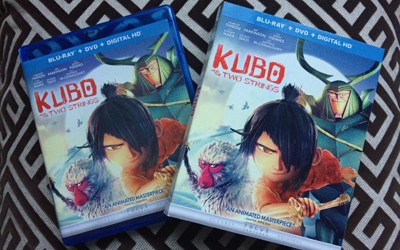 | 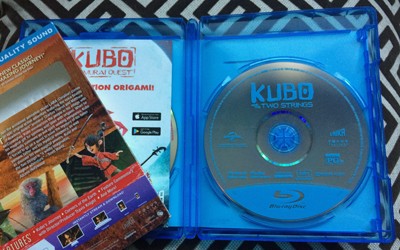 |
Kubo and the Two Strings crashes onto Blu-ray in a fairly standard package from Universal Home Entertainment, a two-disc set containing the Blu-ray and DVD, each of which feature bland, silver-topped artwork as has become customary of the label. An embossed slipcover spices up the package, though, with raised lettering and character designs alongside the quasi-woodblock design on the front. A Digital Copy Slip has also been tucked inside.
Video and Audio:
Kubo and the Two Strings really strikes a chord on Blu-ray, but that's unsurprising considering the beauty of the stop-motion animation and Universal's track record with their previous releases of Laika's films. The fantastical journey was breathtaking in theaters, and it's just as breathtaking at home: this 2.35:1-framed, 1080p AVC transfer is packed to the brim with vivid shades of color and ornate textures in the character models and sets, ranging from Japanese-inspired villages to rain-covered shots of open seas, lush green journeys through forests, and bustling hikes across snow-covered landscapes. Laika's playfulness with the palette coaxes fresh, inviting colors out of the high-definition treatment -- the pinkish hues around Monkey's eyes and mouth, dark greenish-yellow murkiness underwater, the almost-pastel shades of muted, glowing blues of specters -- which are immaculately saturated and kept under control alongside the faultless contrast levels. Fine details are everywhere, from strands of hair to weathered samurai armor and amber leaves, which are always sharp and retain the textile property of the stop-motion creations.
Considering those stop-motion roots, one might not be prepared for the sheer amount of genuine action that takes place in Kubo and the Two Strings, from aggressive martial-arts battles to encounters with a few different massive beasts. The DTS-HD Master Audio track is, thus, given a daunting quest to overcome with the clanking of blades, the thumping of bodies, and the pounding of waves, all of which sounds tremendous in high-definition. The bass channel tackles the aggressive elements like a champ, boasting deep, throaty impact without unnecessary or out-of-control rumble, creating a vigorous rush of activity that boasts as much -- if not more -- intensity as many of the tentpole blockbusters that came out this year. Delicate, nuanced effects are also in great supply here, from folding origami paper to a fish splashing in water and ceramic bowls lightly touching a hard surface, which remains exceedingly clear and convincing throughout. Dialogue holds onto the same property, balancing clarity with mid-range bass response, while the gorgeous strums of the guitar and the other musical elements are robust yet incredibly natural ... and everything ventures out to the surround channels with authenticity. Phenomenal audio treatment.
Special Features:
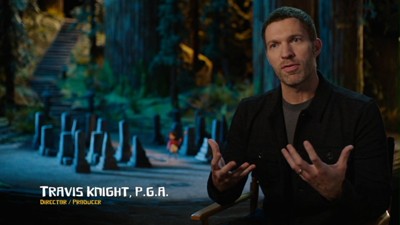 |  |
Commentary with Director Travis Knight:
Director Knight warns the audience that they should possibly lower their expectations toward his first commentary track for his first directorial effort, and it's a dose of mildly charming casualness that isn't exactly indicative of the track to come ... which, by the way, ends up being a great thing. He's clearly prepared for this discussion, and the fusion of scene-by-scene elaboration and tangential discussions about the complex artistry that goes into these productions proves to be a delightful experience, if a tad studious and rehearsed in tempo. Knight discusses the materials used to get the origami textures right and the geometry of sequences, pointing out which sequences involve touches of computer-generated effects and which ones require extra-arduous handmade effects (such as grooves in snow and the material that makes up Kubo's hair), name-drops of Star Trek and Star Wars for different reasons and references, and a wealth of thematic symbols and intentions. Knight has no problem pulling back the curtain on how it's all made, and it's a great track for it.
Kubo's Journey (28:34, 16x9 HD):
Similar to how Universal has handled previous home-video releases for Laika's films, they've included a connected collection of interviews and behind-the-scenes shots, elevating the standard press-kit snippets found in other home-video presentations. They delve into the cultural and historical inspirations in the film, navigating the complications of capturing extremely large puppets, rendering convincing elemental effects for water, and the work that went into capturing a specific mood for the film's music. The snippets are bookended by discussions by director Travis Knight, crafting a satisfying glimpse into some of the components that went into the creation of Kubo and the Two Strings.
Universal have also included a few other quick featurettes that retrace many of the same steps as the previous extras, only in more compact form. Corners of the Earth (3:12, 16x9 HD) takes a general and quick glimpse at the numerous environments captured in the film, featuring shots of the research and production elements that went into crafting their vision, while The Myth of Kubo (2:33, 16x9 HD) centers on general discussion about the film being "a stop-motion samurai film", and features a few tastes of interviews from the tentpole actors in the film. The DVD Copy of the film doesn't come loaded with all the special features listed above, missing all of Kubo's Journey except for the section focused on its Japanese inspiration, but it does include the commentary and about fifteen minutes or so of the extras.
Final Thoughts:
I left the theater thinking that Kubo and the Two Strings was a magical, sprawling, and thrilling animated experience with something profound and metaphorical at its core, and that sentiment has stuck around after a second viewing, elevated by further appreciation of the artistry that Laika poured into its conception. Kubo's journey takes him through the fantastical and the melancholy, culminating into a stunning stop-motion action film that's full of boundless beauty, splashes of affable humor, and a strong emotional current that elevates it to one of the year's best films, period. Universal's Blu-ray presents these things in the utmost audiovisual quality on Blu-ray, and comes with a insightful, scholarly commentary with director Travis Knight and satisfactory half-hour of featurettes. A few more extras (and a trailer) would've been nice, but the technical presentation of this wonderful film and the available features takes the quality up just high enough to earn DVDTalk's Collector Series stamp of approval.
|
| Popular Reviews |
| Sponsored Links |
|
|
| Sponsored Links |
|
|
| Release List | Reviews | Shop | Newsletter | Forum | DVD Giveaways | Blu-Ray | Advertise |
|
Copyright 2024 DVDTalk.com All Rights Reserved. Legal Info, Privacy Policy, Terms of Use,
Manage Preferences,
Your Privacy Choices | |||||||









